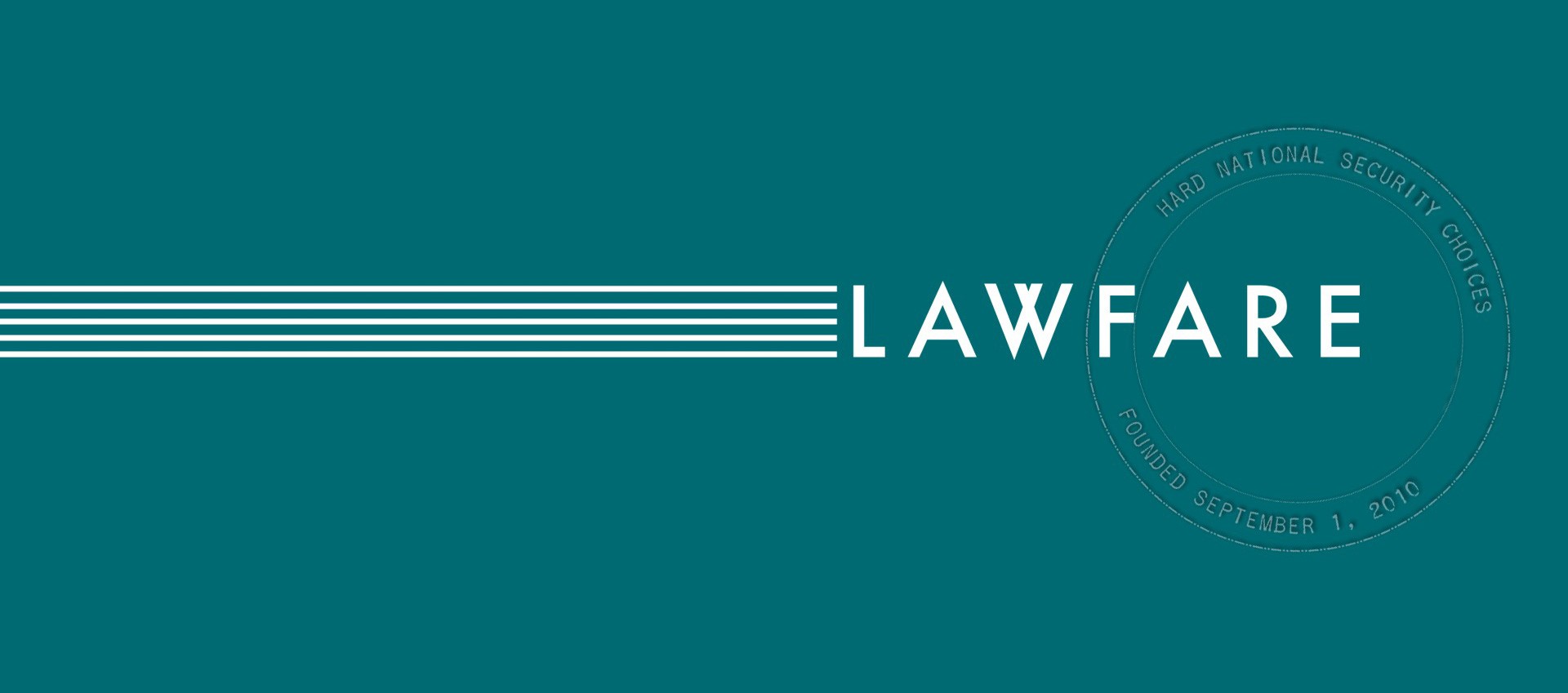The Week That Was: All of Lawfare in One Post

Published by The Lawfare Institute
in Cooperation With

Quinta Jurecic discussed the gag orders placed on former President Donald Trump in New York and D.C. and how the courts are weighing the legal and political dangers of limiting Trump’s speech against preventing the harassment and violence that might follow his comments.
Caleb Benjamin shared the Minnesota Supreme Court’s ruling dismissing a complaint seeking to disqualify Trump from the state’s primary and general election ballots under Section 3 of the 14th Amendment.
On this week’s episode of “Lawfare Live: Trump’s Trials and Tribulations,” Benjamin Wittes sat down with Anna Bower, Jurecic, Adam Klasfeld, and Alan Rozenshtein to discuss the Minnesota Supreme Court’s Section 3 disqualification ruling, the government’s response to Trump’s motions to dismiss in the Jan. 6 case, updates from Fulton County, and more:
Anna Hickey provided a dispatch in absentia of the Nov. 1 hearing before Judge Aileen Cannon on motions for revised pretrial and trial schedules in the Mar-a-Lago classified documents case.
On the Lawfare Podcast, Wittes sat down with Bower, Josh Gerstein, and Roger Parloff to discuss Section 3 disqualification litigation in Minnesota and Colorado, Judge Cannon’s CIPA rulings in the Mar-a-Lago case, the latest from Fulton County, and more:
On an episode of Chatter posted on both the Lawfare Podcast and Chatter feeds, Wittes sat down with Rachel Maddow to discuss her new book, “PREQUEL: An American Fight Against Fascism,” its relationship to the modern fight against populist authoritarianism, law enforcement as an inadequate solution to authoritarian movements, and more:
Gia Kokotakis examined the cases of 18 individuals—each linked to QAnon and an extremist militia—arrested in connection with the Jan. 6 attack on the U.S. Capitol. She explained that QAnon and the militia movement share three core ideologies: a belief that the government is corrupt, apocalypticism, and a responsibility to defend against purportedly pernicious actors.
On the Lawfare Podcast, Wittes sat down with Molly Reynolds to discuss the national security issues filling new Speaker of the House Mike Johnson’s (R-La.) plate, including aid for Israel and Ukraine, assistance for Taiwan, the border, FISA Section 702, and more:
Reflecting on 50 years since the passage of the War Powers Resolution (WPR), Scott R. Anderson argued that the statute has constrained the executive branch, empowered Congress, and vindicated Congress’s constitutional role in matters of war and peace.
Matt Gluck described seven takeaways from the 106 publicly available WPR letters issued since 2001 and noted additional revelations from other non-WPR war powers reporting.
On Rational Security, Anderson, Jurecic, and Rozenshtein sat down to discuss this week’s big national security news stories, including calls for the Biden administration to push for a ceasefire in Gaza, how courts are approaching Trump’s right to speech outside of the courtroom, the reported plan for a revenge campaign by Trump and those close to him if the former president returns to the White House, and more:
On the Lawfare Podcast, Gluck sat down with Fionnuala Ní Aoláin, the outgoing U.N. Special Rapporteur on counterterrorism and human rights, to discuss her experience as special rapporteur, the harmful consequences of certain counterterrorism financing, her conversations with Guantanamo Bay detainees, detention facilities in northeast Syria, and more:
Hannah Sweeney summarized the annual report and accompanying comments presented to the U.N. General Assembly by the president of the International Court of Justice covering the court’s 2022-2023 judicial year.
Tadeusz Koczanowicz discussed the recent elections in Poland, the pro-democracy implications of Donald Tusk’s victory, and the elements of illiberal democracy that persist in the country.
Paul M. Barrett examined the impact of Meta’s Oversight Board. He argued the board suffers from two major flaws: its inability to compel Meta to implement its recommendations, and its lack of a clear theory for how free-speech principles formulated to constrain government censorship should be applied to private platforms.
On the Lawfare Podcast, Eugenia Lostri sat down with Justin Sherman to discuss how people search data brokers use public information and contribute to stalking and abuse, what policymakers can do about this problem, and more:
Scott Shapiro, Sean O’Brien, Laurin Weissinger, and Wittes shared the eighth class in Lawfare’s Hacking and Cybersecurity course, entitled, “Networking III.” They covered digital signatures, domain name systems, the process of hacking domain name systems, and more.
And Lawfare featured Tom Uren’s Seriously Risky Business newsletter, and will continue to do so every Friday. The newsletter examines core infosec issues, with a particular focus on intelligence and government policy.
And that was the week that was.

